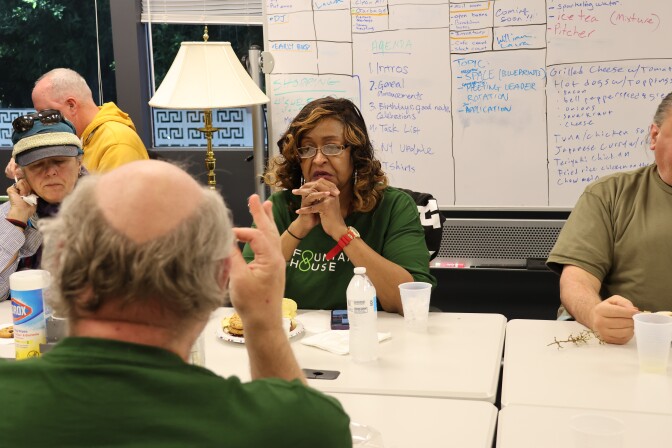This story is free to read because readers choose to support LAist. If you find value in independent local reporting, make a donation to power our newsroom today.
‘Community Is Therapy’: Why LA Is Getting A Clubhouse For People Living With Serious Mental Illness

For many people, living with a serious mental illness — like schizophrenia or bipolar disorder — can be an isolating experience. Treatment and therapy in clinical settings can address many needs, but they don’t often offer a sense of community.
Enter: the clubhouse.
For decades, the clubhouse service model has offered people with serious mental illness around the country employment support, daily meals and education.
Research has shown it can help people find jobs, go back to school and keep them out of the criminal justice system.
So far, Los Angeles hasn’t had its own clubhouse. But that's expected to change this summer.
A hope for L.A.
In 2012, Georgette Darby had lost her job and was down on her luck.
“When I became homeless I had an onset of mental illness, and it was hard to find a place to stay. Especially in downtown L.A.,” Darby said.
Living with major depressive disorder, Darby said she struggled for a long time trying to find a program that would accept her. It took a total breakdown before she was finally able to get help.
“I tried to walk in front of an MTA bus, because I just couldn’t handle it anymore,” Darby said.
She now has permanent housing thanks to a local outreach program. And for the past six months, Darby has worked with the nonprofit Fountain House to establish a mental health clubhouse — a place that might help people like herself.

Fountain House has a contract with L.A. County to build a clubhouse in Hollywood this year.
“Hopefully, clubhouses can bring folks in like myself to get the help and the services that they needed without being stigmatized,” Darby said. “That’s my hope.”
A decades-old model
For 75 years, proponent say, the clubhouse model has given thousands of people living with serious mental illnesses a place to belong, offering not only daily meals, job training and housing support, but a community of peers.
What started with a small group of former patients at Rockland State Hospital in upstate New York coming together to support each other has grown into an international movement, with more than 350 clubhouses in 32 countries.
Clubhouses have taken off in New York City and Detroit, and there are a few in San Diego.
“It’s kind of like the best kept secret,” Francesca Pernice, director of Counseling Psychology at Wayne State University in Detroit, told LAist.
Pernice said she started studying clubhouses more than 20 years ago. The clubhouse model, she said, brings people together who might otherwise tend to isolate because of their illness. And they come together willingly.

People who are served by the clubhouse model are referred to as “members,” not “patients,” as they would be in a hospital setting.
“The most rigorous outcome is they tend to decrease psychiatric rehospitalization over time,” Pernice said. “And that tends to really speak in terms of dollars saved to either taxpayers, insurance companies.”
Jason Bowman, a senior advisor to Fountain House who’s helping to set up the new clubhouse in Hollywood, said members and staff work side-by-side on anything from cooking daily meals to putting on film festivals and art shows.
The new clubhouse won’t offer housing on site. But when it comes to addressing homelessness, Bowman said, housing is just one part of the equation.
“You can put someone in their own apartment, but then they’re going to just sit there without any community... They might have more community on the street,” he said.
According to county authorities, the L.A clubhouse will be part of the larger Hollywood 2.0 project, a county Department of Mental Health pilot program that takes inspiration from the public mental health system in Trieste, Italy. The program integrates supportive housing with a mental health urgent care center, clinical space and other services.
‘I would probably be dead’
Cyrus Napolitano has been a clubhouse member for more than 15 years and is co-director of the Clubhouse New York Coalition. When he first came to a Fountain House clubhouse, he was very sick and barely able to function, he said.
“I wouldn’t be where I am today if I didn’t have this program,” Napolitano said. “I would probably be dead.”
Napolitano is helping to get L.A.’s clubhouse off the ground, working with Darby and other prospective members. He said he has been open about living with bipolar disorder, but his diagnosis is not what defines him in that space.
“You’re part of a community where we’re helping each other find a job or go back to school,” he said. ”Or find a place to live and deal with Social Security benefits. Everybody is participating in one way or the other to support each other and move forward into life.”
‘Poised for growth’
Earlier this month, U.S. Congressmember Ritchie Torres of New York founded the Clubhouse Caucus to advocate for improved mental health care through clubhouses established around the country.
So why aren’t there more in California?
Bowman said funding is an issue. And historically, Fountain House — which is based on the East Coast — hasn’t pushed for expansion. But that's changing.
The organization has a four-year contract with L.A. County for $1 million in funding per fiscal year, as long as certain goals are met.
Bowman said he hopes that after the temporary clubhouse location opens in Hollywood this summer, the organization will open a permanent one by the end of the year that serves 100 members.
“People want innovation. They want change,” Bowman said. “There’s a tremendous need, and there’s a lot of money... California is really poised for growth of our model.”








